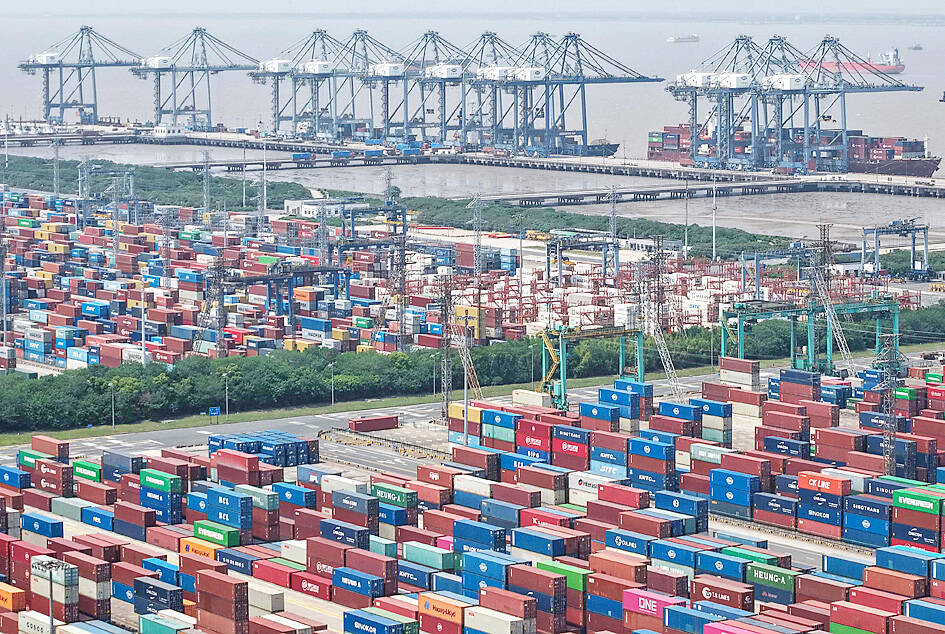Chinese exports rose more than expected last month even as shipments to the US slumped sharply in the first month after US President Donald Trump targeted its goods with tariffs above 100 percent.
The first official hard data after the trade war escalated captures only the initial damage from the prohibitive tariffs, with their effects likely to become more pronounced starting this month.
The expectation of many analysts is that unless the levies come down, trade between the world’s two largest economies would eventually crumble after reaching almost US$690 billion last year, harming industries and raising prices for companies and consumers.

Photo: AFP
Shipments to the US fell 21 percent from a year earlier after the imposition of duties earlier last month, Chinese General Administration of Customs data released yesterday showed.
Meanwhile, Chinese tariffs on US goods led to imports falling almost 14 percent last month.
Chinese firms were able to increase their sales in other markets to compensate for the drop to the US, with total exports expanding 8.1 percent last month, far more than forecast by economists, but down from a gain of more than 12 percent in March.
Shipments to India and the 10 ASEAN members soared by more than 20 percent, while exports to the EU were up 8 percent. Imports fell 0.2 percent for the second straight monthly decline, leaving a trade surplus of US$96 billion.
Exports to Thailand, Indonesia and Vietnam surged by double digits, in what one analyst called a “structural repositioning” of trade.
“The global supply chain is being rerouted in real time,” Stephen Innes of SPI Asset Management wrote in a note. “Vietnam looks set to become China’s offshore escape hatch for US-facing goods.”
“The manufacturing juggernaut is diverting flow wherever the tariff pain isn’t,” he added.
US and Chinese negotiators are meeting this weekend for their first trade talks since Trump took office this year. Companies are hopeful both sides can eventually agree to a reduction in the levies each has imposed on the other.
US Secretary of the Treasury Scott Bessent is to lead the talks, and has called the current tariffs “unsustainable.” He and his team are to start meetings today with a Chinese delegation led by Vice Premier He Lifeng (何立峰).
While the two sides have staked out strong positions, the Trump administration is weighing a dramatic tariff reduction during the negotiations to de-escalate tensions and temper the economic pain both are already starting to feel, people familiar with preparations said.
The US side has set a target of reducing tariffs below 60 percent as a first step that it believes China might be prepared to match, and progress in two days of scheduled discussions could see those cuts being implemented as soon as next week, they said.
The sudden changes to US trade policy in the past few months have brought chaos to global trade. While countries are scrambling to negotiate a permanent reprieve from the tariffs announced last month, companies are trying to get goods into the US before they can be taxed.
The US trade deficit soared in March to a record, and likely continued to swell last month before starting to drop off this month, according to Bloomberg Economics.
Additional reporting by AFP

SEMICONDUCTOR SERVICES: A company executive said that Taiwanese firms must think about how to participate in global supply chains and lift their competitiveness Taiwan Semiconductor Manufacturing Co (TSMC, 台積電) yesterday said it expects to launch its first multifunctional service center in Pingtung County in the middle of 2027, in a bid to foster a resilient high-tech facility construction ecosystem. TSMC broached the idea of creating a center two or three years ago when it started building new manufacturing capacity in the US and Japan, the company said. The center, dubbed an “ecosystem park,” would assist local manufacturing facility construction partners to upgrade their capabilities and secure more deals from other global chipmakers such as Intel Corp, Micron Technology Inc and Infineon Technologies AG, TSMC said. It

NO BREAKTHROUGH? More substantial ‘deliverables,’ such as tariff reductions, would likely be saved for a meeting between Trump and Xi later this year, a trade expert said China launched two probes targeting the US semiconductor sector on Saturday ahead of talks between the two nations in Spain this week on trade, national security and the ownership of social media platform TikTok. China’s Ministry of Commerce announced an anti-dumping investigation into certain analog integrated circuits (ICs) imported from the US. The investigation is to target some commodity interface ICs and gate driver ICs, which are commonly made by US companies such as Texas Instruments Inc and ON Semiconductor Corp. The ministry also announced an anti-discrimination probe into US measures against China’s chip sector. US measures such as export curbs and tariffs

The US on Friday penalized two Chinese firms that acquired US chipmaking equipment for China’s top chipmaker, Semiconductor Manufacturing International Corp (SMIC, 中芯國際), including them among 32 entities that were added to the US Department of Commerce’s restricted trade list, a US government posting showed. Twenty-three of the 32 are in China. GMC Semiconductor Technology (Wuxi) Co (吉姆西半導體科技) and Jicun Semiconductor Technology (Shanghai) Co (吉存半導體科技) were placed on the list, formally known as the Entity List, for acquiring equipment for SMIC Northern Integrated Circuit Manufacturing (Beijing) Corp (中芯北方積體電路) and Semiconductor Manufacturing International (Beijing) Corp (中芯北京), the US Federal Register posting said. The

India’s ban of online money-based games could drive addicts to unregulated apps and offshore platforms that pose new financial and social risks, fantasy-sports gaming experts say. Indian Prime Minister Narendra Modi’s government banned real-money online games late last month, citing financial losses and addiction, leading to a shutdown of many apps offering paid fantasy cricket, rummy and poker games. “Many will move to offshore platforms, because of the addictive nature — they will find alternate means to get that dopamine hit,” said Viren Hemrajani, a Mumbai-based fantasy cricket analyst. “It [also] leads to fraud and scams, because everything is now